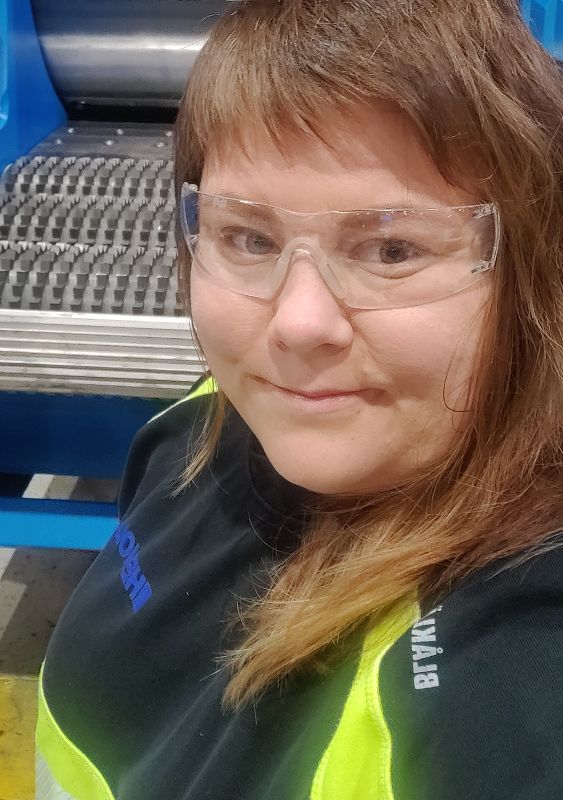Project manager, sawmill industry
"This profession requires cooperation skills, as well as problem-solving and pressure tolerance. In addition, you must know how to work in a group and share responsibility with others. It is important to be able to tolerate uncertainty and changing schedules. Many situations require fast reactions, but you must also be able to stop and think about the next move."

- Marleena Pasanen
- Works as a project manager at Heinola Sawmill Machinery Inc.
- Has completed a bachelor's degree in mechanical engineering at Turku University of Applied Sciences.
- 12 years of work experience in the field.
Briefly explain what you do for a living.
I work as a project manager for industrial wood chippers, i.e. I am responsible for the assembly of the chippers from the tendering stage to the final commissioning. Chippers are devices that produce wood chips and are used in sawmills, pulp and paper industry and in bioenergy production. Chippers can be used, for example, to utilise wood waste, produced in the sawmill industry, which can be used in energy production after chipping. In addition, I am responsible for the main design of chippers, which includes preparing tender and assembly drawings, product development and managing various documents.
How have you ended up in the profession of your choice?
Already at school, I liked to take the leader role in group work. I've always been interested in technology and natural science.
Through a few coincidences, I ended up studying to become a mechanical engineer. After graduation, I worked as a mechanics designer, for example in the shipping industry. When I started at Heinola Sawmill Machinery, I first continued in the same tasks, but I have always had a passion for project work. My work tasks soon expanded, and I became a project manager.
Describe your typical working day or week.
My workday often starts with checking my emails. I also go through all the acute work. When the assembly of the chippers is in progress, I visit the installers whenever I have time to see what the situation is in the process of piling up. If necessary, I solve problems and check the dimensions from the 3D model.
I collaborate a lot with my colleagues and participate in meetings with customers and suppliers. A part of the day I work on my computer and prepare project-related documents and mechanics design for the chippers.
What kind of work environment or working hours do you have?
I work in the office, remotely and in the factory with overalls on. In addition, I visit customers for example in connection with commissioning.
I have flexible working hours, so I can influence the length of my working day. As a rule, I work between 6.30 am and 4 pm on weekdays, and the working day is approximately eight hours long. When I carry out installation monitoring, the days can be very long, and I might also have to work on weekends.
What kind of competence or qualities are required in the profession?
This profession requires cooperation skills, as well as problem-solving and pressure tolerance. In addition, you must know how to work in a group and share responsibility with others. It is important to be able to tolerate uncertainty and changing schedules. Many situations require fast reactions, but you must also be able to stop and think about the next move.
What is the best thing about your profession?
The best part of this work is variability, as new challenges arise every day. I also like to have the freedom to decide what task I want to complete and when. On the other hand, I have a lot of responsibility, because all work must be done, and projects must proceed according to schedule. It's nice to work with different types of people, and I don't have to sit on my computer all day. Once the chipper has been delivered and the customer is satisfied, it gives you energy and a good mood.
What are the downsides of the profession or what seems challenging?
When there are several chipper projects under way at the same time, and many different responsibilities and tasks that need to be carried out, it sometimes feels challenging. The workload varies, as at times there is a lot of work to be done and sometimes it is calm.
What would you tell a person considering the profession of a project manager in industry?
Be open-minded. In this job, there is no fear of doing the same things day in, day out and getting bored.
How do you see the future of your profession?
Economic fluctuations affect the sawmill industry, but its future looks bright. Technology is constantly evolving, which also requires continuous product development for chippers.
